Writing an Essay in 6 Hours (or less): A guide to University life
Can be used more than once

Hello, I'll keep this introduction short since you are probably in a time squeeze. I'm currently finishing my degree at university and wanted to help those who might not have learnt the skill of last minute essay writing. This isn't an answer to your essay, but a format (with added tips) for you to speed through a 3000 word essay. I cannot guarantee any specific mark, but it has worked for me in so far that I haven't failed any essay's since early high school and I've kept an upper 2:1 average for college (UK marking standards). Lets get right to it then,
Writing a plan (10 to 20 minutes MAX)
First and most important thing is to write a plan. Yea it sounds dumb and like a waste of time: "Why would I waste time not writing my actual essay?" Because it will mean you write your essay way easier. This doesn't need to be detailing every single micromanaged sentence. You need to be able to visualize the structure of the essay and know where you are going. Make it simple and break it into parts. For example, if I was writing a 30o0 word essay on international law considerations for the environment.
Introduction(200 words):
-Intro sentence on international law (Being vague is fine)
-Outline any assumptions or considerations for your arguments
-Outline hypothesis
-Outline conclusion
Main Body Part A (Arguing that law is to weak)- make sure to have broad argument points in your plan so you know where you are going.
- Law is good to stop disasters
-Law helps bring in money for government because of taxes
-Makes company bring good social impact
-etc...
Keep the themes broad. Don't even think about references right now, they don't matter yet.
Just focus on making the outline. I prefer doing it on paper so I can scribble all around with any new thoughts I might have throughout the writing process but its up to you.
How long your essay is kind of determines the structure but, I would recommend having and introduction followed by the main arguments (if you need to mention both sides then one section for each side) be the large majority of my essay, no abstract, and a very small conclusion.
Once you have that sorted you can open the word doc.
Three Key things for the actual document.
One, create a title page immediately.
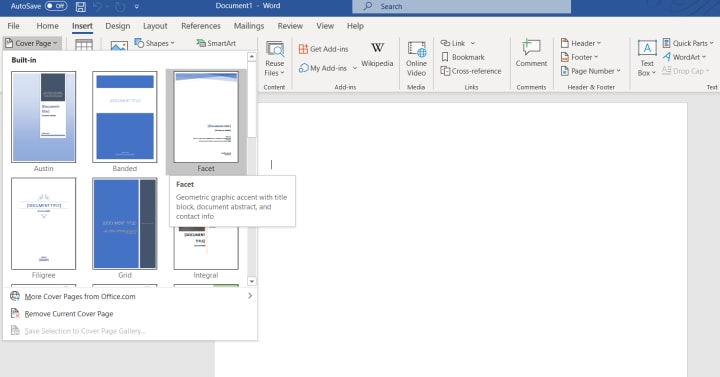
Two, table of contents (Put a page break right after it so you can jump to the next page.
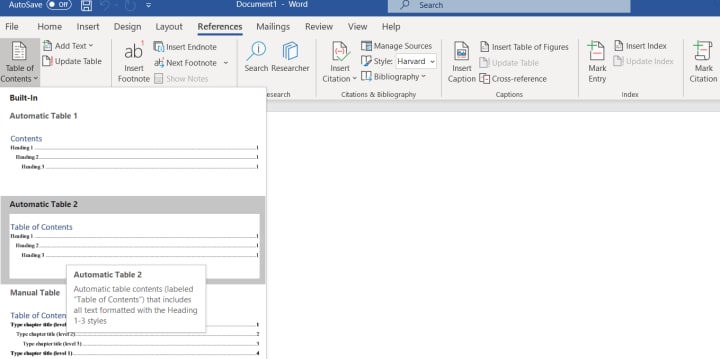
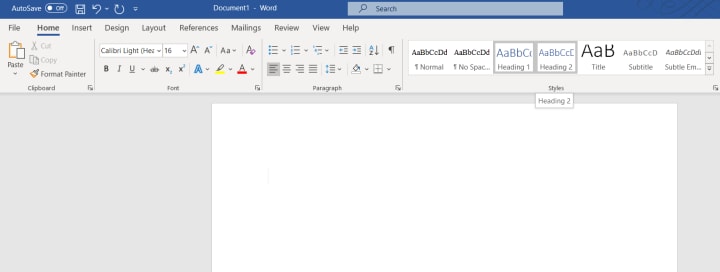
Three, create a bibliography box at the bottom of the page. VERY IMPORTANT
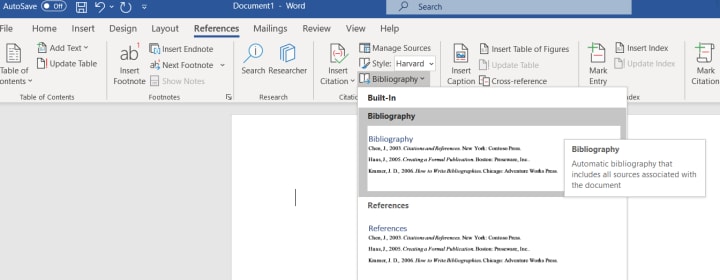
Word will do most of the work that people waste so much time with basically automatically. You can use the styles tab to make the table of contents really easy. Headings 1 and 2 you can use for signposting and then the normal one for writing. Once you finish just go to the table of contents and update the whole thing. Anytime you change stuff you can just go and update it and it will change the order, so there is no fuss with that.
Bibliography is very similar, when you have to cite something (which we will get to later) you can just insert citation on the references tab. As per below.
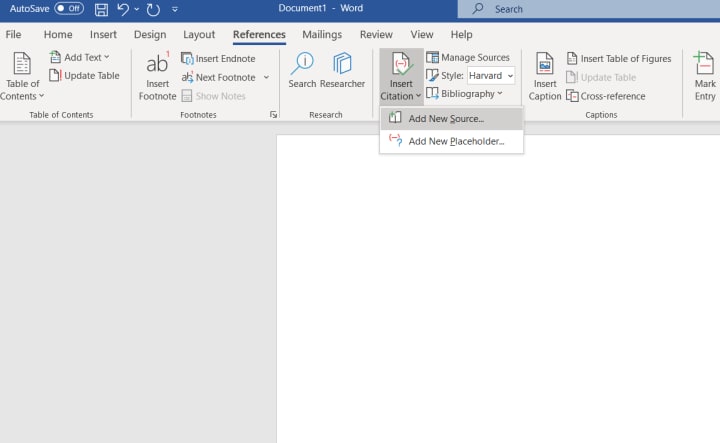
Once you click complete word will automatically add a reference to wherever you are typing
That Sums up the first quick bits and bobs to take care of quickly before you start, just so everything flows easier. One of the main things to take as advice is that if you spend time on your setup everything happens a lot faster. So don't be scared at using 30 minutes just to make sure things will flow.
To wrap up the setting up part, I like to include a header with both page numbers on the right and my exam number on the left. Professors always take marks off if you don't include that in my university so just a recommendation, makes it easier for them too.
Moving On!
Now, writing the actual body of the essay. Paragraph structure is key here. For that we will have 2 types of paragraph and 3 parts for each paragraph. Type 1 paragraphs go as follows- Part 1) Is the argument . Part 2)Is the Information. Part 3) is the example. Don't make the mistake of thinking your paragraphs have to be long. Make them 200 words as a maximum, or else you just start wasting words.
Type 1 Paragraphs
Part 1
This paragraph is the most important because this is where you argue your point for the first time. It doesn't matter what point it is, people always think they dont have good arguments. Realistically its not that important to have a roc solid argument if you only have 6 hours to write. What you need to make sure of is that you can promote that argument well, rather than make sure its good by itself. Just follow the structure. For example,:
"Law is good to stop disasters" Type 1, Part 1
Legislation can help prevent disaster as it stops companies from taking advantage of unprotected land in underdeveloped countries in order to get rid of toxic waste.
At this point you are going to do part 2 of type 1 paragraphs. This information bit is about developing the depth of that first sentence with relatively relevant information/supporting arguments. This now brings in the referencing part.
You will likely have gotten reading for your course, which you might not have done (I wouldn't either). But it does not mean you can't use them, all you need is to open them as PDF's (To know which references to use you just need to think about which topics your structure focuses on)-Teachers generally organise the material by topic week so it's really easy to just find which week/weeks-. Once you find the relevant weeks and sources (I generally just open all the sources from the weeks I think are relevant) from those weeks these are going to be your main references- you don't need to read them. Also, do not worry about opening too many references, you probably wont use all of them but if you are not sure what weeks/sources will be good its better that you just open all of them.
Once you open them as PDF's on new tabs you are going to do two things.
1- Read the tile and decide if they are relevant. If not you can just close the tab.
2-skim through the abstracts/introductions/summaries (whatever they chose to call it)- The documents themselves will tell you their conclusions. This is key because it will tell you whether they are on your side or not! If they are, the you keep them open, if not close them (unless your title wants you to argue both sides). This will save all of the time you need on references.
If they are on your side and the title is relevant, you can add them into any bit that they are relevant for.
Most of the time intro's will also outline their arguments- which you can use as references in your essay (use them as quotes or as pairings for your examples). What you need to do is use those arguments in a non plagiaristic manner. Because you cant use arguments as examples (as we will see in the example section) you can just use them as part of the example-I will show you in a bit. So, references are really useful as support for your arguments, you can throw them into whatever they help with. Don't be shy with them and be aware of statements that might need you to reference. They are a really important part of type 1 paragraphs- and essay in general. So, as a whole you need a) references b) a key point to make and c) an example. For example:
"Legislation can help prevent disaster as it prevents companies taking advantage of unprotected land in underdeveloped countries in order to get rid of toxic waste."
Countries with high levels of corporate pollution are seen to have lower levels of legislation(SOURCE XYZ). This is largely due to their demand for capital and foreign investment (SOURCE ABC) which motivates lower levels of environmental legislation(SOURCE TFH).
This bit in bold could be an argument from a journal, not one I came up with. Here I use it in a way that makes it important to my essay, but also gives it credit to the author. That way its now a stronger example and, if you need it, it uses more words.
The underlined bit is a good reference, alone that statement is just an opinion or guess. With a reference it now becomes an important part of the argument and not something your professor can mark down.
Your references are, realistically, arbitrary. The teachers have generally read thousands of essays with very similar questions- especially if the course has been running for a long time or if they are an external examiner. Which means the main focus for references is making sure you aren't plagiarising. Not whether they are meticulously chosen for your arguments.
Which is where the example and external references come in. External references generally go hand in hand with examples but, the key to them is the infamous Google Scholar (which we will get to in a second).
So, continuing with our example,
"Legislation can help prevent disaster as it prevents companies taking advantage of unprotected land in underdeveloped countries in order to get rid of toxic waste. Countries with high levels of corporate pollution are seen to have lower levels of legislation(SOURCE XYZ). This is largely due to their demand for capital and foreign investment (SOURCE ABC) which motivates lower levels of environmental legislation(SOURCE TFH)."
"This can be seen through the case study conducted on COUNTRY X and their lack of government support in order to abolish dumping by large corporations in eco friendly manners(EXTERNAL SOURCE). It can also be found that the levels of legal defences against this are little to non-existent, as per (EXTERNAL SOURCE)."
At this point you need to apply parts 1 and 2 of the paragraph to part 3. Use the arguments in a manner that makes them relevant to the example. It doesn't matter which example you use as long as you can throw in references and incorporate whatever arguments you make.
To find external references its exactly like Google. You can simply type in something related to your essay. So for this essay one would type in: "International environment law success". Once more, just like Google, you will be bombarded with a load of stuff on the subject. If you have very little time you don't need to even think much about the sources. Find ones with relevant titles and summary's and incorporate them. If you have more than 12 hours then you can be more meticulous. That means making sure they aren't from like 1915 or if they have been disproved/ made irrelevant. What you should no do is go to page 30 and find something someone wrote for a tabloid- that is where you lose marks for what I like to call "fake academia". Its just unreliable information.
*JOURNALS ARE YOUR FRIENDS*
There is a massive congregation of information, you will find reports, conference proceedings, journals, articles, etc. Use the ones, in the right places(we will target this), that are relatively reliable and that support your arguments. This means, journals, proceedings with dates on them, things that have been referenced before, etc. Don't worry about spending hours on finding out this information, Google Scholar does most of it for you. The tab on the left lets you chose most of the important aspects of the references they show you. Its better to find titles that relate to your essay, then just do a quick check of whether it was published through a company or journal or organisation etc. It's quite rare to find bad sources on pages 1 to 5 of google scholar searches so don't panic and don't spend 1 hour per source seeing if its reliable. Nobody has that kind of time. Just make sure its not Daily Mail or The Sun (sorry for the UK references).
Lastly, for the examples and references, use images if they show the data! Images are great since they add the visual aspect, and you can use ones from your sources, just remember to reference them underneath and if they don't have one, add a title.
My best trick with images is just PrtScr (printscreen) and paste it onto paint( the in built app), that way I can cut whatever bits I want. It also means they wont add any words or come up in Turnitin.
Type 2 Paragraphs
These are a lot more abstract because they just expand on your type 1 paragraphs. You are still welcome to use examples but using external references and your class references are the key, I prefer using external references since they give more breadth (literally anything) on what I can argue or expand into.
E.G
Furthermore, this lack of inhibition for global corporations has further repercussions other than environmental impacts. The economic and social impacts it can have are also severe. Not only is there a direct influence on poverty levels through its effect on availability of natural resources such as clean water (CITATION). But it also impacts corruption levels in governments as seen through (EXAMPLE). As per Figure A (any relevant image) we can see that... And so it goes on.
A few key tips here is using connecting words such as furthermore, consequently, in addition, etc. If you are proposing a counter argument things such as however, contrarily, on the other hand, etc.
Secondly, don't block out your thoughts, just write with them. If they are incoherent or you want to move them to another section that is easy to fix without wasting time. This is especially useful for word count struggles, though I think you will probably need to cut words rather than add them.
This should make up the largest bits of the essay, in the main body and intro. I wouldn't allocate many words to the conclusion since it is realistically a restatement of what would be your abstract.
For your conclusion I suggest a simple paragraph structure of:
- Summarize your arguments-literally, nothing fancy
- Display how they could be applied to other things- ANY RANDOM STUFF, it really does not matter what.
- Mention some broad things about your research area such as how fast it changes or how unreliable things are etc.
- Finish
They are not that intense but it helps you more than the reader in that they will give you some reflection on your arguments and structure (If you have time for that).
Below is a little rendition of what I would recommend spending time with depending on how much time you have.
Less than 4 Hours- and you get a 0 for not submitting
-Plan it (20 minutes max)
-Focus on just writing. Forget double checking, any random things like making sure references are recent or the best ones to use. JUST GET THAT WORD COUNT.
-Speed through referencing, don't spend more than 15 minutes on the external references, just use the class ones that are easy to find.
-Please don't forget to reference though. You don't want a plagiarism accusation since they are really terrible and very easy to avoid.
-Unless you already have clear examples in mind use less examples since you need to research to find them and it wastes time. Just create hypotheticals if you can, they are easier and way faster.
If you finish writing with time to format then format= Organize fonts, titles, footnotes, paragraphs, file name, headers, page numbers, and title page.
If you get only a specific mark detriment per 24hrs of late submission consider receiving the penalty and spend that time writing a proper essay. But it depends on you and how confident you are on not procrastinating.
12 hours or less
With 12 Hours or less things are way calmer than 4 hours.
-Spend time with external references. This means find a bunch and use a bunch.
-Develop your paragraphs, no need to speed write them. Focus on sentence structure once you finish the paragraph and try to make things flow.
-Double check. The worst thing ever, I know. But it helps to make things better, believe me. A very useful tip is using Ctrl+F to find words you might repeat. Search general words and you will stop yourself from repeating the same word 4 times in a small space. Plus, it's really fast.
-Formatting is pretty simple so you can leave that for last, and don't spend too much time on non-essentials. The main things are those mentioned in the 4 hours or less scenario.
-Use relevant examples, you can spend 1 hour researching 6 or 7 of them, and finding good references for them too.
-TAKE BREAKS. If you end up tired after 3 hours it will only hurt your mark. Take breaks to eat, call your friends, read a bit, etc. Take your mind off of the essay every 45 minutes or so just to refresh. Not for 1 hour ok, you don't have 1 week to write this. Maybe 15 minutes, depends how much you know yourself and your concentration skills.
24 hours or less
At this point you are in the safe zone so don't stress too much
- The only things that are different than for the 12 hours is that you can consider reading some of the key references. It can be helpful for giving you more arguments if you are struggling with that, and you have enough time.
-Don't cut out sleeping hours. Take a full sleep cycle, whatever that may be for you. It is not worth going all night, if you sleep it means you can think properly in the morning. I find it much better to sleep at a reasonable time and wake up early to write in the morning, but that is me and you might be different. The important part is sleep- whenever is good for you.
-Take breaks and chill for a bit or else we overheat, just like computers.
2 days or more
This guide is not YET for you.
A Compiled List of Tips and Tricks That Hopefully Help
- Google scholar is your friend-Use its settings for specifications
- Journals summarise arguments and findings in abstracts and introductions
- Word Docs have pre settings for all your organisation needs, and referencing needs too.
- Essay plans are lifesavers
- Use print screen and paint for images, its super helpful for editing
- Reference, reference, reference
- Ctrl+F is super helpful to find any repetitions
- Take breaks- eat and hydrate, don't die trying to write this essay please.
- Don't write 500 word paragraphs
- Don't be afraid of statistics and graphs, they can help bring your argument to life
- Let your brain think, and write it down! If you stop yourself from writing that is when the word count becomes menacing. And if you have time you can edit arguments you think are bad afterwards!
- Don't plagiarise, you can write whatever it is you need to write!! It is never worth it.
I hope this helps you in whatever it is you need to write. Just a disclaimer that any of the examples I used were just stuff I came up with on the spot, none of them were researched or anything so don't reference this. I also cant guarantee any specific mark or quality of work for you, though I do hope this helps.
Lastly, a completely random and irrelevant quote that I like:
When the sun comes up tomorrow it will dawn on us. But for now we shine like the stars we understand.
- Simon Armitage
About the Creator
Enjoyed the story? Support the Creator.
Subscribe for free to receive all their stories in your feed. You could also pledge your support or give them a one-off tip, letting them know you appreciate their work.





Comments
There are no comments for this story
Be the first to respond and start the conversation.